


xxxxxThe English novelist Anthony Trollope published The Warden in 1855, the first in a series of novels based upon middle-
ANTHONY TROLLOPE 1815 -
(G3c, G4, W4, Va, Vb, Vc)
Acknowledgements
Trollope: by the British photographer Julia Margaret Cameron (1815-
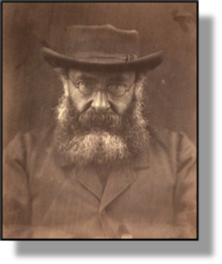 xxxxxIt was in 1855 that the English writer Anthony Trollope wrote The Warden and began a series of varied novels centred around the imaginary cathedral city of Barchester. This series, which gave an extraordinary detailed account of middle class society in the provinces, included Barchester Towers of 1857, Doctor Thorne of 1858, The Small House at Allington of 1864, and The Last Chronicle of Barset in 1867. A second series, begun in 1864 and known as the Palliser novels, concentrated on political rather than social issues, and produced such novels as Phineas Finn, published in 1869, The Eustace Diamonds in 1873, The Prime Minister in 1876, and The Duke's Children in 1880. Trollope was a prolific writer, despite the fact that he held down a full time job for much of his life. In addition to his 47 novels, he frequently contributed to periodicals, and wrote a large number of travel books and short stories.
xxxxxIt was in 1855 that the English writer Anthony Trollope wrote The Warden and began a series of varied novels centred around the imaginary cathedral city of Barchester. This series, which gave an extraordinary detailed account of middle class society in the provinces, included Barchester Towers of 1857, Doctor Thorne of 1858, The Small House at Allington of 1864, and The Last Chronicle of Barset in 1867. A second series, begun in 1864 and known as the Palliser novels, concentrated on political rather than social issues, and produced such novels as Phineas Finn, published in 1869, The Eustace Diamonds in 1873, The Prime Minister in 1876, and The Duke's Children in 1880. Trollope was a prolific writer, despite the fact that he held down a full time job for much of his life. In addition to his 47 novels, he frequently contributed to periodicals, and wrote a large number of travel books and short stories.
xxxxxTrollope was born in London. His father was a one-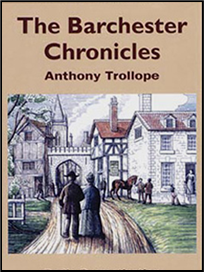 ecidedly Irish theme.
ecidedly Irish theme.
xxxxxHis Barchester Chronicles, his best known work, recorded in rich, faithful detail the sheltered, genteel life of the middle classes in Victorian England, concentrating at first on clerics and religious matters, and then moving to an examination of personal relationships amid the gentlefolk and prosperous landowners of a fictitious cathedral city. Each novel had its own particular theme and thus contributed in its own way to an all round appreciation of the society he had under the microscope. These works proved popular in their time, and they provide today a fascinating insight into a comfortable, prosperous way of life that has long since disappeared.
xxxxxTrollope returned to London in 1859, and after retiring from his civil service post in 1867, tried to enter parliament as a Liberal the following year. He was not successful, and it was perhaps for that reason that he continued with his series of parliamentary novels, begun with Can You Forgive Her? in 1864. In these works he stayed in the same milieu as that of the Barchester Chronicles, but immersed himself in the world of politics and property through th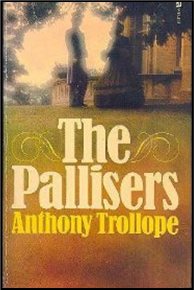 e fortunes of the Pallisers, an aristocratic family, and the nouveau riche Phineas Finn. These realistic novels of political life were played out against the workings of the British parliamentary system.
e fortunes of the Pallisers, an aristocratic family, and the nouveau riche Phineas Finn. These realistic novels of political life were played out against the workings of the British parliamentary system.
xxxxxAnd in fairness to Trollope, these novels provided much more than a careful and, at times, gently sardonic commentary on a particular section of Victorian society. Though written in a plain style, they provided a study in depth of a gallery of varied characters, not only in his chronicle novels, but also in his individual works, such as his Orley Farm of 1861, He Knew he was Right of 1868, Sir Harry Hotspur of Humblethwaite of 1870, and his later work, Kept in the Dark, of 1882.
xxxxxDuring his retirement he travelled widely, and this provided the material for travel books on the West Indies, North America, Australia, New Zealand and South Africa. Also worthy of mention is his social satire entitled The Way We Live Now. Published in 1875, it highlighted and deplored the decline in moral standards. His Autobiography, published after his death in 1883, was a candid account of his working life as a writer. His health failed him in his last few years, and he lived them out in a village in Sussex. He died in London after suffering a stroke.
xxxxxIncidentally, we are told that in order to produce such an abundance of novels he got up early every morning and wrote for three hours before going to work. He planned to write about 3,000 words in t hat time! ……
hat time! ……
xxxxx…… As a surveyor’s clerk in the Post Office, Trollope played a prominent part in the introduction of the pillar box, first erected in Jersey in 1852 and then at Botchergate in Carlisle, England, the following year. Thexidea had been put forward earlier by Rowland Hill (1795-
Including:
Thomas Babington Macaulay

Va-
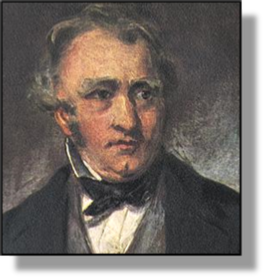 xxxxxIt was in the year of 1855 that the third and fourth volumes of The History of England were published, the works of the English historian and politician Thomas Babington Macaulay (1800-
xxxxxIt was in the year of 1855 that the third and fourth volumes of The History of England were published, the works of the English historian and politician Thomas Babington Macaulay (1800-
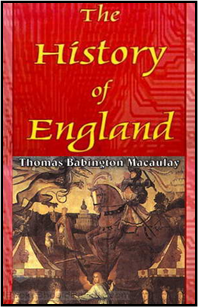 xxxxxThe work was popular not so much for its historical content -
xxxxxThe work was popular not so much for its historical content -
xxxxxMacaulay was born at Rothley Temple in Leicestershire, the son of Zachary Macaulay, an ardent supporter of William Wilberforce in his fight for the abolition of the slave trade. The eldest of nine children and highly intelligent, he had written an outline of world history and a narrative poem entitled The Battle of Cheviot by the age of eight. After attending a private school, he went up to Trinity College, Cambridge to study law, and it was while there that he wrote his essay on Milton for The Edinburgh Review, the first of many articles he produced for this renowned journal. In 1830 he entered parliament as member for Calne in Wiltshire. A strong supporter of the Whig party, he soon made his name as a powerful and eloquent speaker in the cause of reform, arguing for religious toleration and the extension of the franchise.
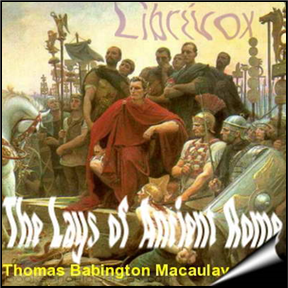
xxxxxDuring the mid-
xxxxxIt was after this that, putting aside his political interests, he began the slow, painstaking task of writing his history of England. In 1852 he was again voted into Parliament, but by then his health was failing and it was with some difficulty that he completed his fourth volume in 1855. The following year he left his house in Piccadilly, his home since 1840, and moved to Campden Hill on the outskirts of London. He was created Baron Macaulay of Rothley in 1857, and died two years later with the last volume of his history recording events up to 1702, a date which, regrettably, fell well short of his intended closure of 1820. Macaulay knew nothing of art or music, and showed little interest in science and technology, but he had a brilliant command of literature, and he was an historian of exceptional talent. In bringing to life the major events of history, he ranks alongside his fellow Englishman Edward Gibbon for the width of his knowledge, -
xxxxxIncidentally, as a politician Macaulay was a forthright orator who knew his own mind and gained a reputation for a man who would rather talk than listen. The English writer and wit Sydney Smith -
xxxxx…… Although Macaulay’s History was widely read, the particular view of English history he made popular -
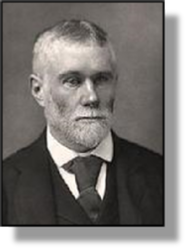
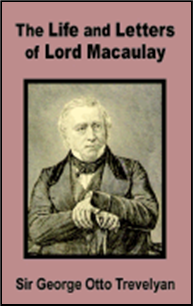 xxxxx…… The English historian and politician George Otto Trevelyan (1838-
xxxxx…… The English historian and politician George Otto Trevelyan (1838-
xxxxxIt was in 1855 that the third and fourth volumes of The History of England were published, the work of the English historian Thomas Babington Macaulay (1800-


